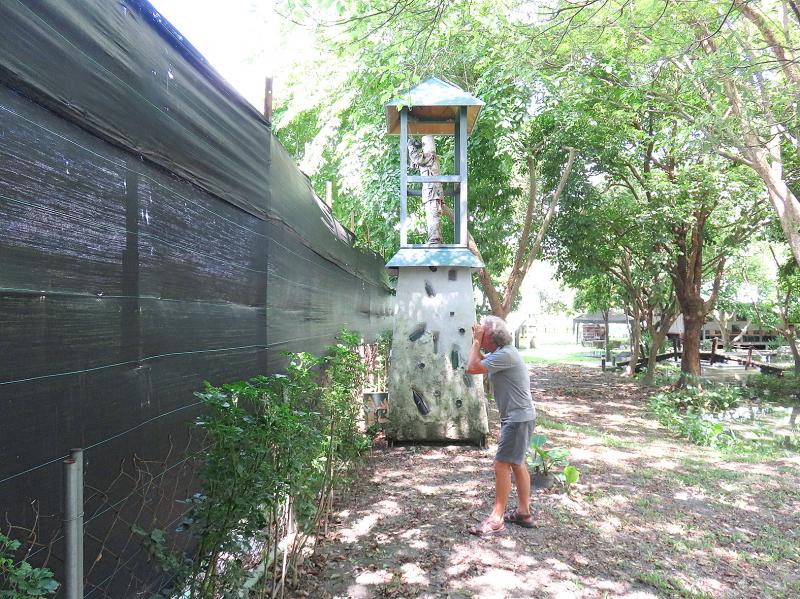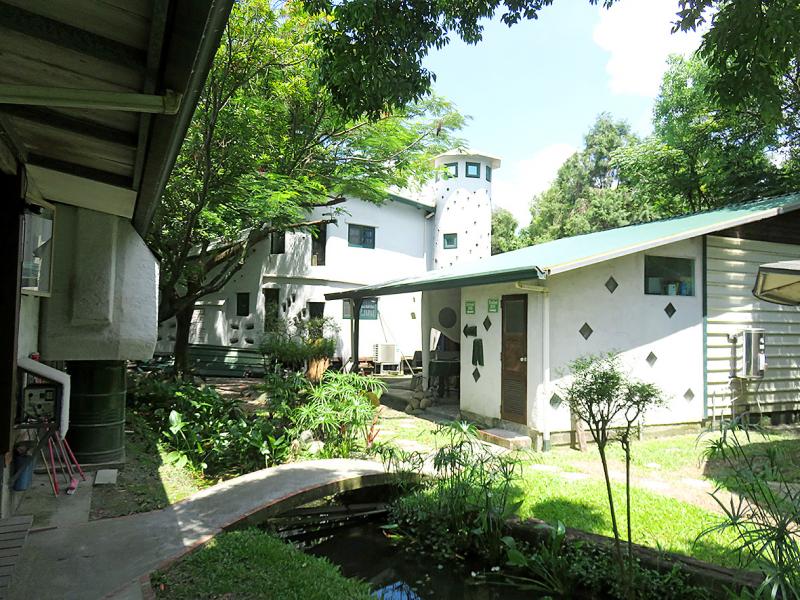The broken authoritarianism of the Chinese Nationalist Party (KMT) planted many cancers in the body of Taiwan’s emerging democracy. Few have done as much harm at the local level as the impunity of local businesses and the weakness of local governments.
Last Thursday my friend John Lamorie, who runs a leisure farm called DaMorLee (大茉莉農莊) in Ligang Township (里港), Pingtung County, invited me down for the day to chat about his situation. In 2006 Lamorie and his wife purchased a plot of rural land for their retirement. That piece of land was surrounded by rural land, with a small plot a stone’s throw away zoned for industrial use.
As time went by the local government came in and asked for permission to use some of the land on the south side of the property to put in an irrigation ditch and a road. Lamorie agreed with the proviso that it should put it as far to one side of his property as they could get it, but this condition was ignored, he says. As a result, a slice of his land is on the other side of the ditch and the road.

Photo: Michael Turton
Lamorie, an energetic and talented man in his 70s, with decades of experience in the building trades, and his wife went ahead and built a lovely leisure farm, which has become well known. It boasts attractive buildings made of papercrete, a pond with over 6,000 fish, trees with several species of nesting birds and an expanse of grass. It has been featured on TV news reports, newspaper articles and several books.
About a decade ago a stone company moved in on the nearby piece of industrial land. They also bought up the neighboring farmland. They built a fence across the road, which had been Lamorie’s land and was then government land, and then tore up a section of the road and put in a parking lot for their trucks. They occupied the slice of his land on the other side of the ditch.
TWILIGHT STRUGGLE

Photo: Michael Turton
Thus began a long twilight struggle, not only with the stone company, but also with the organs of local government, from the executive agencies to the police and the court, simply to get what Lamorie says is an illegal company to return the road to its original state, return his land that they have occupied and take down an enormous black fence they have built along two sides of his property, which he says is on his land.
“Makes the place feel like a prison,” he growls.
Lamorie, who has a rich sense of humor, decided to mock the fence by building a tower to look over it, in which he placed a mannikin dressed as a soldier and holding a pair of binoculars.
When the road along his property’s south edge was put in, Lamorie gave some eight-inch pipe to the construction company to put in for drainage, since none had been planned, he said. He said that the stone company has blocked the pipes several times with stones and concrete.
In 2011 the stone company seized the road, and planted some banana trees on government land. Then they put in a building, but he had that demolished. Lamorie planted some fruit trees on that parcel of land, but the government accused him of stealing it because they had planted trees on it, and they had to pay a fine.
Another time, he took down the fence the stone company had built across the road, and the police came out to ask him about it. That’s right: The stone company can take the government land and put its buildings and trucks on it, no problem. The statistics about factories on farmland hide their true pernicious effect.
One of the most bitter ironies of this affair, from Lamorie’s point of view, is his experience with local officialdom.
“There is no rule of law in Pingtung County,” he says.
Lamorie has written over 2,000 letters to government officials. He says that his tactic is to write officials in Taipei, rather than local officials.
He had dinner with a senior judge once, who told him he should be careful because the stone company was dangerous, a sentiment echoed by the police. If they are dangerous, he asks, “why don’t you people do your job?”
The stone company has fought back in many ways. They posted surveillance cameras to watch his property and once when he removed a cloth from the fence that he says is on his property, and threw it back onto the company’s land, he was successfully prosecuted for vandalism.
Years ago he and his wife operated an English school in Ligang, properly licensed, which he says the stone company threatened to shut down, and which it reported for alleged violations of the law, such as illegally employing foreigners (Lamorie is a Taiwanese citizen).
VIOLATIONS OF THE LAW?
Ironically, says Lamorie, it is the stone company that is doing violating the law. He says he has videos of foreign workers who work at the company doing work that is not permitted by their Alien Resident Certificate.
One night creosote was used to tar one of the buildings on his property, leaving permanent stains.
Another time, the company put plastic trash bins filled with fish guts at one end of the fence next to his farm and a trash bin filled with guts from a slaughterhouse, including the carcass of a butchered dog, at the other. The stench was horrific. He says it took him five weeks to get the Environmental Protection Agency (EPA) to do something about it.
Noise has also been a battleground. Lamorie has had the EPA come and measure the noise levels several times. He says that each time he calls them, the noise from the stone company suddenly falls about 30 minutes before the EPA people arrive, and then remains low until 30 minutes after they leave. Then it resumes.
The EPA also came out when oil leaked from a pipe the stone company had built and killed the fish in his pond. They told him not to eat the fish in the pond, and to protect himself as best he could, and that they were not going to take action against the company.
Another time he reported an illegal building that the company had built on government land. A county official told him it didn’t exist, showing him an old picture from Google Earth. Standing in his office, he says, he demanded they look on the most recent Google Earth. Sure enough, the building was there. Today, years later, it still is.
Then the litany of excuses are commonly heard by anyone who has had to deal with this kind of problem: “other places are noisier” one official told him. “Just leave the farm,” officials suggest.
A local official in a relevant agency, who lived nearby, listed all the illegal things the stone company was doing, Lamorie said, but then did not do anything, according to. The prosecutor in the vandalism case told him that if he didn’t like Taiwan’s laws, he should leave.
Taiwan comes in for much praise for its democracy, but in practice observers mean things like Taiwan’s national and local election processes or its innovative e-government initiatives. Its impoverished, ineffective, unjust and negligent local governments remain, a threat to Taiwan’s democratic consolidation, and too often, a failure for the people who need them.
Notes from Central Taiwan is a column written by long-term resident Michael Turton, who provides incisive commentary informed by three decades of living in and writing about his adoptive country. The views expressed here are his own.

Jacques Poissant’s suffering stopped the day he asked his daughter if it would be “cowardly to ask to be helped to die.” The retired Canadian insurance adviser was 93, and “was wasting away” after a long battle with prostate cancer. “He no longer had any zest for life,” Josee Poissant said. Last year her mother made the same choice at 96 when she realized she would not be getting out of hospital. She died surrounded by her children and their partners listening to the music she loved. “She was at peace. She sang until she went to sleep.” Josee Poissant remembers it as a beautiful

Before the last section of the round-the-island railway was electrified, one old blue train still chugged back and forth between Pingtung County’s Fangliao (枋寮) and Taitung (台東) stations once a day. It was so slow, was so hot (it had no air conditioning) and covered such a short distance, that the low fare still failed to attract many riders. This relic of the past was finally retired when the South Link Line was fully electrified on Dec. 23, 2020. A wave of nostalgia surrounded the termination of the Ordinary Train service, as these train carriages had been in use for decades

Lori Sepich smoked for years and sometimes skipped taking her blood pressure medicine. But she never thought she’d have a heart attack. The possibility “just wasn’t registering with me,” said the 64-year-old from Memphis, Tennessee, who suffered two of them 13 years apart. She’s far from alone. More than 60 million women in the US live with cardiovascular disease, which includes heart disease as well as stroke, heart failure and atrial fibrillation. And despite the myth that heart attacks mostly strike men, women are vulnerable too. Overall in the US, 1 in 5 women dies of cardiovascular disease each year, 37,000 of them

Politically charged thriller One Battle After Another won six prizes, including best picture, at the British Academy Film Awards on Sunday, building momentum ahead of Hollywood’s Academy Awards next month. Blues-steeped vampire epic Sinners and gothic horror story Frankenstein won three awards each, while Shakespearean family tragedy Hamnet won two including best British film. One Battle After Another, Paul Thomas Anderson’s explosive film about a group of revolutionaries in chaotic conflict with the state, won awards for directing, adapted screenplay, cinematography and editing, as well as for Sean Penn’s supporting performance as an obsessed military officer. “This is very overwhelming and wonderful,” Anderson